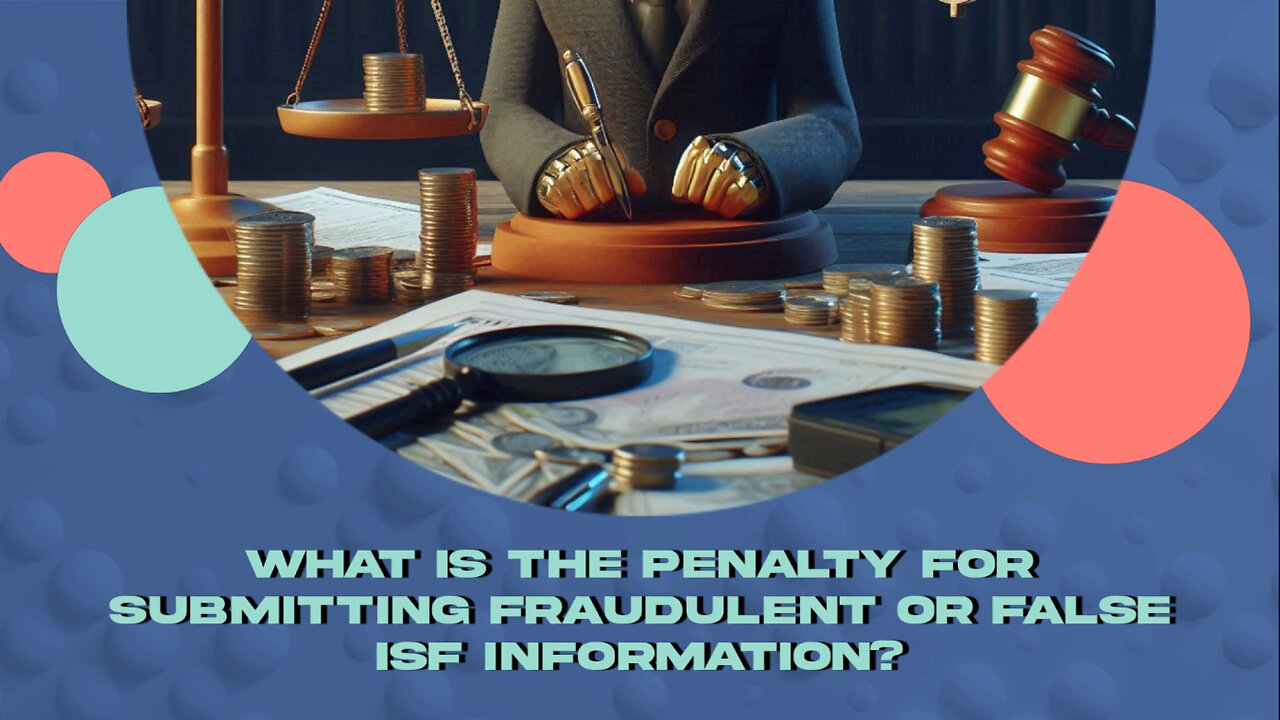Premium Only Content

Fraudulent ISF Submissions: The Costly Consequences You Need to Know
US Customs Clearing | 213-270-1930 | info@uscustomsclearing.com | https://uscustomsclearing.com/
This response delves into the topic of penalties for submitting fraudulent or false Importer Security Filing (ISF) information in customs brokerage. It provides an overview of ISF and its mandatory filing requirement implemented by the US Customs and Border Protection (CBP). The consequences of submitting fraudulent or false ISF information are discussed, including the potential for monetary penalties and criminal charges. The authority of CBP to assess penalties and the varying amounts based on the severity of the violation are outlined. The shared responsibility between importers and their authorized agents, such as customs brokers, is highlighted, emphasizing the importance of accurate and truthful information. Best practices are suggested for maintaining compliance and avoiding penalties, and the importance of educating oneself on customs regulations and requirements is emphasized.
#usimportbond #isfcustomsbroker #uscustomsclearing #isfentry
Video Disclaimer Here: For learning purposes only, We claim no affiliation with any US government agency.
00:32 - Understanding ISF and Its Importance: Importer Security Filing (ISF) is a mandatory requirement by U.S. Customs and Border Protection for cargo entering the U.S. by vessel, aimed at ensuring compliance and addressing national security risks.
01:38 - Penalties for Fraudulent ISF Information: Submitting false or fraudulent ISF information can lead to severe penalties, including monetary fines up to $10,000 per violation and potential criminal charges under federal law, impacting both importers and their agents.
02:33 - Best Practices for Compliance: To avoid penalties, importers and customs brokers should ensure accuracy in ISF filings by double-checking information, maintaining effective communication, staying updated on regulations, and seeking professional guidance.
-
 LIVE
LIVE
Donald Trump Jr.
1 hour agoBREAKING NEWS: My Father Revokes Biden-Maduro Oil License, LIVE with Maria Corina Machado | Triggered Ep.220
9,904 watching -
 LIVE
LIVE
The Jimmy Dore Show
35 minutes agoTrump AG Pam Bondi WON’T Release Epstein List! Corp Media ABANDONS Greta Thunberg! w/ Chris Hedges
6,233 watching -
 LIVE
LIVE
Dr Disrespect
7 hours ago🔴LIVE - DR DISRESPECT - NEW PC VS. DELTA FORCE - MAX SETTINGS
3,421 watching -
 49:04
49:04
Lights, Camera, Barstool
1 day agoIs The Monkey The Worst Movie Of The Year?? + Amazon Gets Bond
2.65K -
 24:19
24:19
Adam Carolla
19 hours agoDiddy’s Legal Drama Escalates, Smuggler Caught Hiding WHAT? + Philly Eagles & The White House #news
1.28K1 -
 10:12
10:12
Mike Rowe
2 days agoClint Hill: What A Man. What A Life. | The Way I Heard It with Mike Rowe
5.6K5 -
 1:31:52
1:31:52
Redacted News
2 hours agoBOMBSHELL! This is war! FBI whistleblowers reveal Epstein files being destroyed? | Redacted News
70.7K126 -
 48:55
48:55
Candace Show Podcast
3 hours agoSTOP EVERYTHING. They FINALLY Mentioned ME In The Blake Lively Lawsuit! | Candace Ep 152
49.4K45 -
 1:02:51
1:02:51
In The Litter Box w/ Jewels & Catturd
22 hours agoWhere are the Epstein Files? | In the Litter Box w/ Jewels & Catturd – Ep. 750 – 2/26/2025
50K50 -
 DVR
DVR
Revenge of the Cis
4 hours agoLocals Episode 198: Suits
30.6K7